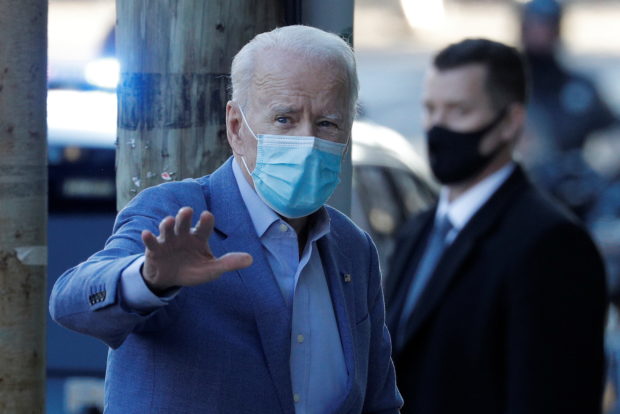
FILE PHOTO: U.S. President-elect Joe Biden walks into the Queen Theatre in Wilmington, Delaware, U.S., January 10, 2021. REUTERS/Tom Brenner
The FBI has warned of possible armed protests being planned for Washington, D.C., and in all 50 U.S. state capitals in the run-up to President-elect Joe Biden’s Jan. 20 inauguration, a federal law enforcement source said on Monday.
Threatened with more violence from outgoing President Donald Trump’s supporters following last Wednesday’s storming of the Capitol, the FBI issued warnings for next weekend and run at least until Inauguration Day, the source said.
In other steps to safeguard the U.S. capital, the National Guard was authorized to send up to 15,000 troops to Washington, and tourists were barred from visiting the Washington Monument until Jan. 24.
The Chief of the National Guard Bureau, General Daniel Hokanson, told reporters he expected about 10,000 troops in Washington by Saturday to help provide security, logistics and communications.
He said the number could rise to 15,000 if requested by local authorities.
At least one lawmaker asked the Pentagon to do more.
Senator Chris Murphy, who said he was sending a letter to the acting secretary of defense on Monday, said it was unclear if the National Guard would be sufficient to protect the nation’s capital and active duty troops may be needed also.
“I’m not afraid of taking the oath outside,” Biden told reporters in Newark, Delaware, referring to the traditional setting for the swearing-in ceremony on the Capitol building grounds. But he said it was critically important that people “who engaged in sedition and threatened people’s lives, defaced public property, caused great damage” be held accountable.
Biden’s inaugural committee said on Monday the theme of the Jan. 20 ceremony will be “America United.” Trump said last week he would not attend the ceremony, a decision the president-elect supported.
Washington monument closed to tours
The Park Service said it would suspend tours of the Washington Monument, an obelisk honoring the country’s first president, due to safety concerns from threats to disrupt the inauguration.
FILE PHOTO: The sky turns shades of red as the sun rises behind the U.S. Capitol, the Washington Monument and the Lincoln Memorial in Washington, U.S., November 19, 2020. REUTERS/Kevin Lamarque//File Photo
Washington Mayor Muriel Bowser called for the U.S. Interior Department to cancel public gathering permits through Jan. 24. “This inaugural planning period has to be very different than all the others,” she told reporters on Monday.
In a letter to Acting Homeland Security Secretary Chad Wolf made public on Sunday, Bowser called for a fresh approach to security after what she called last week’s “unprecedented terrorist attack.”
Bowser asked Wolf to extend the National Special Security Event period from Monday through Jan. 24. The Secret Service heads security operations for events, including presidential inaugurations, considered to be nationally significant.
Wolf said in a statement he had instructed the Secret Service to begin National Special Security Event operations for the inauguration effective Jan. 13, instead of Jan. 19 as previously scheduled.
The assault on the Capitol, challenging the certification of Biden’s victory in a November election, sent lawmakers into hiding and left five people dead. Dozens of people have been charged in the violence and hundreds more cases are expected.
Despite evidence of a fair election, Trump has challenged the validity of Biden’s substantial victory. Democrats in Congress began a push on Monday to force Trump from office, introducing an article of impeachment that accuses him of inciting insurrection.
The presidential inaugural committee and Bowser have told Americans not to travel to the inauguration, and said Washington’s National Mall will be covered with 191,500 flags of different sizes, to represent the missing crowds.
A U.S. presidential inauguration traditionally draws hundreds of thousands of visitors to the U.S. capital, but the ceremonies have been scaled back dramatically because of the COVID-19 pandemic.